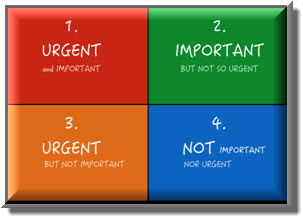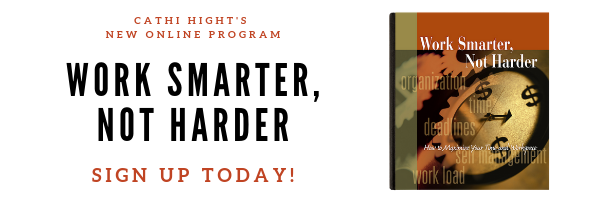“Work Smarter, Not Harder” is a common cliché we hear often.
One of the questions I ask participants in the Work Smarter, Not Harder program is “What does ‘work smarter’ mean for you?”
For some, working smarter means planning ahead of time, doing things efficiently, and finding ways to do things faster. I agree that all of these definitions would help us to work smarter, but knowing what it means and putting it into practice isn’t that easy. Afterall, it was easy to work smarter, we’d all be doing it right, right?
Understanding How We Spend Our Time
We each have 365 days with 8,760 hours each year to work, play, sleep and spend our allotted time. How we choose to use our time is based on our roles, goals, intentions and preferences.
Stephen Covey helped us to understand how we spend time by explaining the Eisenhower Time Management Matrix in his popular book 7 Habits of Effective People.
Most of us spend 80 – 90% of our time in quadrants 1, 2 and 3 by putting out “fires”, working on things that seem urgent but don’t help us achieve goals, and on trivial tasks and over-socializing. Dealing with “crises of the moment”, unnecessary meetings and interruptions, and procrastination and sidetracking consumes our most valuable asset—time — which once spent cannot be regained.

Covey advocates that highly productive people spend about 50% of their time in quadrant 2, focused on doing things that are important and not urgent.
This is the lesson in Habit 3: Put First Things First by defining what’s most important, how to get there, prioritizing activities and allocating time to do them. It’s about working on the right things at the right time and minimizing the amount of time spent in other quadrants.
Quadrant 2 Helps Us Work Smarter
Over the years, I’ve come to define “work smarter” as spending time on activities that “pay forward”.
Investing time on building relationships and partnerships (professionally and personally), strategic planning, product development, streamlining processes, outsourcing, and leveraging technology all create future payoffs.
Here are three strategies to help you work smarter and ensures that time invested pays you more in the long run:
- Identify common timewasters that prevent you from spending time in quadrant 2 and minimize them (e.g., interruptions, unnecessary or inefficient meetings, excessive email processing).
- Allocate a minimum of 25% of your week on quadrant 2 activities and block time on your schedule (e.g., professional development for you and staff, calling on customers/prospects, idea curation).
- Explore ways you can maximize efficiency by outsourcing, leveraging technology, or changing how you do things (including how you manage home activities, deciding what to stop doing).
As a certified Wiley Workplace Solutions Partner, Cathi Hight works with organizations to develop high performing teams, effective leaders and productive work environments. She is President of Hight Performance Group and the developer of the Work Smarter, Not Harder program. Learn more at www.hightperformance.com.


